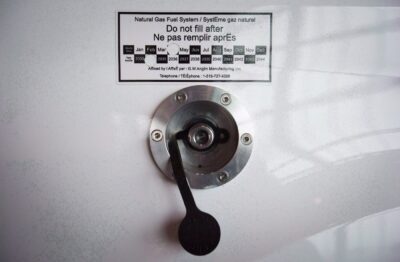B.C., federal governments support LNG facility that’s opposed by some First Nations
By Canadian Press on September 15, 2025.

VICTORIA — The British Columbia and federal governments have announced their support for an LNG export facility floating in waters off the province’s northwest, despite opposition from some First Nations and environmentalists.
A B.C. environmental assessment certificate for the project that is designed to export Canadian gas to Asia has been jointly approved by B.C. Environment Minister Tamara Davidson and B.C. Energy Minister Adrian Dix.
Federal Environment Minister Julie Dabrusin also issued a news release announcing her decision to greenlight the project to move to the next stage of permits and authorization.
The project known as Ksi Lisims LNG is being developed in partnership between the Nisga’a Nation, Rockies LNG Limited Partnership and Western LNG, although documents show the project’s assets will be constructed, owned and operated by wholly owned subsidiaries of Western LNG, based in Houston, Texas.
The decisions by the governments come after examination by B.C.’s Environmental Assessment Office which says that if other permissions are received, the project off Pearse Island will employ up to 450 workers during construction and permanently employ up to 250.
Western LNG says the gas liquefaction, storage and offloading facility is designed to export 12 million tonnes of LNG per year, with operations to begin in late 2028 or 2029.
The Environmental Assessment Office says it consulted with 10 First Nations, several of which did not consent.
It says six First Nations had the opportunity to provide consent, which was granted by the Gitga’at and Kitselas, while it was denied by the Lax Kw’alaams, Metlakatla and Kitsumkalum. The Gitxalaa Nation did not provide a notice on consent.
“In making their decision, the ministers acknowledged that while not all First Nations’ concerns have been resolved, they are satisfied that the conditions and requirements included as part of the environmental assessment certificate reasonably avoid, minimize and accommodate the potential adverse effects on First Nations and their interests,” the office says.
The 23 legally enforceable conditions on the project include that it meet the province’s net-zero policy on greenhouse-gas emissions, that it prioritizes regional and Indigenous hiring, and that a health and medical plan reduces pressure placed by workers on local health services.
A group of environmental advocacy organizations issued a statement voicing opposition to the project.
“Approving another LNG project means more pollution, higher climate risks, and greater harm to our health,” said Thomas Green, senior climate policy adviser with the David Suzuki Foundation.
The project will consist of two floating LNG structures, while terrestrial operations will be constructed on land owned by the Nisga’a Nation.
The assessment office says Davidson and Dix have written to federal ministers urging them to address concerns expressed by First Nations related to marine shipping in making the federal decision.
This report by The Canadian Press was first published Sept. 15, 2025.
The Canadian Press
19-18



